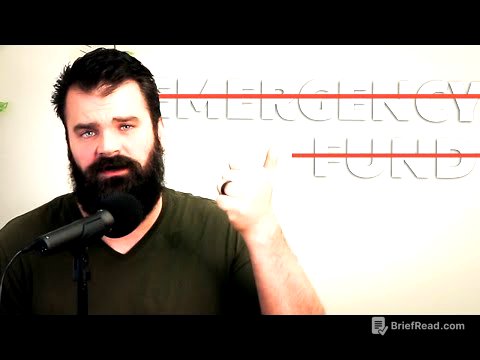TLDR;
This video is a Catholic response to a discussion among Christian influencers regarding various theological points, particularly where they touch on Catholic and Eastern Orthodox beliefs. The speaker addresses topics such as the possibility of losing salvation, the nature of sin, the necessity of baptism, the role of works in salvation, the clarity of the Bible, the intercession of saints, and the Eucharist. The speaker aims to clarify Catholic positions, correct misunderstandings, and foster a spirit of fraternal correction.
- Salvation can be lost, and repentance requires genuine effort to avoid future sin.
- Mortal sins, committed with full knowledge and consent, can lead to spiritual death.
- Baptism is a normative path to salvation, with exceptions for baptism by desire or blood.
- Works are not a means to earn salvation but a sign of true faith.
- The Bible is not an exhaustive list, and tradition helps interpret complex moral issues.
- Saints in heaven intercede for those on Earth.
- The Eucharist is the true body and blood of Jesus Christ, not merely a symbol.
Background [0:00]
The video introduces a response to a podcast featuring Christian influencers discussing Christianity, with some focus on Catholic and Eastern Orthodox views. The speaker, a Catholic, aims to address points of contention raised in the podcast. He expresses admiration for some of the panelists, particularly Cliff Stewart and Rousin, noting Rousin's understanding of Catholic and Orthodox theology. The speaker clarifies that his intention is not to be arrogant but to offer arguments in good faith.
Losing your salvation [1:35]
The discussion begins with the question of whether salvation can be lost. The speaker addresses the doctrine of "once saved, always saved," which originated with John Calvin. He argues that this doctrine implies a loss of free will and contradicts scriptural passages suggesting that one can fall from grace. The Catholic Church believes that dying in friendship with God, or in a state of grace, is necessary for salvation. Repentance involves earnestly trying to avoid sin in the future, not just confessing it.
Deadly sins [3:48]
The speaker addresses the concept of sin, distinguishing between mortal and venial sins. Venial sins weaken one's relationship with God, while mortal sins lead to spiritual death if unrepented. For a sin to be mortal, it must be committed with full knowledge, consent, and be grave in nature. The speaker clarifies that actions like road rage are unlikely to be mortal sins unless they involve intent to murder.
Infant baptism [4:47]
The topic shifts to baptism, specifically infant baptism. The speaker notes that many on the panel are Credobaptists, who believe baptism should only occur after a conscious belief in Jesus Christ. He points out that Martin Luther, a key figure in the Protestant Reformation, supported infant baptism and believed it was salvific. The speaker then transitions to addressing common objections to infant baptism.
Does baptism save you? [6:46]
The speaker addresses the question of whether baptism is necessary for salvation, referencing the story of the thief on the cross as an objection. He clarifies that while baptism is the normative path to salvation, the Catholic Church recognizes exceptions such as baptism by desire or blood. He also highlights an inconsistency among some Protestants who, while claiming baptism is not strictly necessary, view a refusal to be baptized as a red flag indicating a lack of genuine faith. The speaker contrasts baptismal regeneration with the view that baptism is merely an outward profession of faith. He shares a personal anecdote to illustrate the belief that baptism imparts the gift of the Holy Spirit, leaving a permanent mark on the soul.
Works & salvation [9:34]
The discussion moves to the relationship between works and salvation. The speaker agrees with a panelist's statement that genuine faith leads to good works. He clarifies that Catholics do not believe works can earn salvation, which would be the heresy of Pelagianism. Instead, baptism is a gift through which God's grace is received. Works are a sign of true faith, and the Catholic Church agrees with the Lutheran World Federation on justification.
Perspicuity [11:19]
The speaker addresses the Protestant doctrine of perspicuity, which asserts that the Bible is clear enough for any person to understand the path to salvation. He argues that the existence of thousands of Protestant denominations with differing interpretations contradicts this idea. He points out that fundamental beliefs such as who is saved, how we are saved, and why we are saved are disagreed upon. The speaker emphasizes that complex theological issues require careful discernment, which the Catholic Church provides through the Magisterium.
Intercession of the saints [12:51]
The topic shifts to the intercession of saints. The speaker quotes James 5:16, which says that the prayers of a righteous person are powerful and effective. He argues that saints, being in direct communion with God, are well-suited to intercede for us. He cites scriptural evidence that saints are aware of events on Earth and offer prayers. The speaker differentiates between a mediator and an intercessor, stating that saints act as intercessors who connect us to God, while Christ is the sole mediator.
Eucharist [15:30]
The speaker addresses the Eucharist, noting that some panelists struggle with the Catholic belief that the bread and wine truly become the body and blood of Jesus Christ. He explains the concept of transubstantiation, where the accidents (physical appearance) remain the same, but the substance (metaphysical identity) changes. This belief is based on John 6, where Jesus states that one must eat his flesh and drink his blood to have life. The speaker cites Ignatius of Antioch as an early Christian who affirmed the real presence of Christ in the Eucharist.
Cannibalism [18:42]
The speaker addresses the objection that the Eucharist is a form of cannibalism. He argues that cannibalism involves decaying flesh, whereas the Eucharist is the flesh of the living Christ. He also suggests that Jesus partook in the Passover when he instituted the Eucharist. The speaker acknowledges that the Eucharist is a mystery, but one supported by scripture and early Christian belief.
Scripture vs Tradition [19:54]
The final topic is the relationship between scripture and tradition. The speaker affirms that Catholics believe the Bible is the inspired word of God, but it is not an exhaustive list of answers to every moral question. He uses modern issues like contraception and IVF as examples where Protestants disagree on morality. The speaker states that Catholic teachings are based on the Bible, even if some beliefs are not explicitly mentioned. He concludes by expressing appreciation for the work of the panelists and offering his comments in a spirit of fraternal correction.









